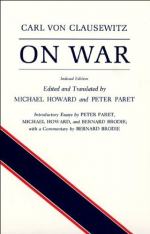
|
| Name: _________________________ | Period: ___________________ |
This test consists of 5 multiple choice questions, 5 short answer questions, and 10 short essay questions.
Multiple Choice Questions
1. What is reading supposed to provide the military reader according to Clausewitz?
(a) A blueprint for war.
(b) Time to reflect on their lives.
(c) A good idea of what to expect on the battlefield.
(d) Preparatory guidance.
2. What is war NOT, according to Clausewitz?
(a) A single long battle.
(b) A short single blow.
(c) A succession of single blows with short periods of peace times.
(d) A long succession of battles.
3. What are Clausewitz views on fear in Book 2, Chapter 3?
(a) It should be ignored are irrelevant.
(b) It is a good condition to put the enemy in.
(c) A large army is less prone to it.
(d) It should be mastered by soldiers.
4. How were the first attempts at theorizing war according to Clausewitz?
(a) Difficult to understand.
(b) Complicated.
(c) Not applicable.
(d) Simplistic.
5. Why do men fight each other according to Clausewitz?
(a) Hostile feelings and hostile intentions.
(b) Hostile intentions alone.
(c) Hostile feelings and need to play.
(d) Hostile feelings alone.
Short Answer Questions
1. What qualities does Clausewitz describe as imperative for a commander?
2. What are the two types of courage mentioned by Clausewitz?
3. What brings value to a strategy according to Clausewitz?
4. What tends to exacerbate falsehood according to Clausewitz?
5. What does Clausewitz say must determine the amount of efforts and resources put in a war?
Short Essay Questions
1. What does Clausewitz say of the analysis of several battles at the same time?
2. What does Clausewitz thinks of the relative strength of attack and defense?
3. What does Clausewitz says about great commanders?
4. What virtue does Clausewitz think are most imperative to a commander?
5. What didn't the invention of gun powder, advances in fire arms and the advance of civilization alter, according to Clausewitz?
6. What type of men are best at dealing with friction according to Clausewitz and how are they found?
7. What are the three separate activities necessary for warfare according to Clausewitz?
8. According to Clausewitz, what was initially considered the art of war by the first war theorists?
9. What is just as important as physical fitness?
10. What does Clausewitz mean by "Destruction of the enemy's forces"?
|
This section contains 734 words (approx. 3 pages at 300 words per page) |

|




